Meaningful Employment for Autistic People: A Social Startup in India Seeks to Transform Lives
Vishnu is a 27-year-old man living in the suburbs of New Delhi, India. Since 2019, he has been working at a local food processing company. There is nothing particularly unusual about that situation, except for one thing: Vishnu is autistic. Employment opportunities for people like him are few and far between — both in India and the broader world — as the challenges associated with autism make it difficult to keep a job.
But this job is different. Vishnu is well-liked at the workplace, and he enjoys the environment. He works at Auspice Social, at a facility in New Delhi, India, that produces a wide variety of naturally dried culinary herbs, spices and seasonings. These seasonings, like all of Auspice’s products, are produced entirely by people with autism.
Autism is a neurological disorder that affects tens of millions of people around the world. Estimates of the prevalence of autism range widely, but in countries with higher awareness and reporting of autism cases (like the United States and United Kingdom), around one in 56 children are believed to be on the autistic spectrum — a rate that’s likely to apply to other countries as well. The causes of autism are still not known, and there is no cure for it — though early intervention may provide people with tools to manage some aspects of the condition. Since autism affects the way a person interacts with and experiences the world around them, the vast majority of adults with the condition are either unemployed or underemployed, despite their ability, desire and willingness to engage in meaningful work. Unemployment rates among adults with autism are far higher than the rates associated with other disabilities.
Meeting the Unique Needs of Autistic Employees
To address these challenges, Auspice Social provides hands-on training and skill development to adults with autism. Our training programs range from three weeks to six months, depending on individual needs, and they culminate with employment at Auspice Social. Workers at our facility are engaged in food processing activities like the cleaning, sorting, grading, grinding, blending, packaging and labeling of spices, herbs and seasonings.
This approach is effective because of its human-centric design, which is based on the unique capabilities of autistic individuals. For instance, most autistic people find it difficult to focus on a single activity for long — for some this may be 30 minutes, for others it may be two hours. Our individual work schedules are designed to take this into consideration: We assign “breakout times” (which are separate from lunch or tea breaks) when employees can listen to music, play indoor games or go for walks on the campus. After these breaks, they are ready to return to the work they were doing previously — and they can do these tasks with a fresh mind that’s ready to focus on them again.
Another element of this human-centric approach involves identifying the unique skills and challenges that each of our employees has — then assigning them only those activities that best utilize their abilities. For instance, if a person has difficulty with fine or gross motor skills and is not able to affix labels on bottles, then perhaps he can fill the bottles instead. Or if someone has sensory issues involving the texture or smell of a spice, we assign a different product for them to process. By individualizing our employees’ work assignments based on their specific abilities, we try to ensure that there is always something a person can do. And since most autistic people are visual learners, we provide job aids in the form of instructional posters and pictures, in addition to the other training we offer.
Employees’ parents and families are also welcome to visit the workplace, and we include them in discussions of work-related issues and future plans. Indeed, family support and buy-in are vital to our success: Interaction with parents and family builds our understanding of our employees and helps us to design their work assignments. But though we aim for flexibility and informality in our interactions with employees’ families, some aspects of our work are subject to strict requirements: For instance, since we are dealing with food products for human consumption, food safety is very important — from the procurement of raw materials to personal hygiene, the cleaning of equipment and compliance with food safety regulations.
For my co-founder Merry Barua and me, Auspice Social is the result of our own personal journeys: Merry’s son Neeraj is autistic, and so is my daughter Prakriti. Before launching Auspice Social, Merry was a pioneer of the autism movement in South Asia — it was thanks to her tireless efforts that autism was included in India’s Disability Act in 2006, and she has spoken at the United Nations about autism. Prior to my involvement in Auspice, I was a food business professional with long experience in the agriculture and restaurant sectors. But personal experience and lengthy resumes are not necessary to embark on a journey like this. Human compassion does not need any track record — it simply happens, just like a flower blooms. As Merry puts it, “Autistic people are an intrinsic part of our society and need understanding, support and opportunities, not charity or misplaced compassion. Just like others, the majority of people with autism want a dignified and productive life. Through our work with them, we believe people with autism can be constructive employees with the right support and training.”
An Inclusive Business Model to Support Autistic People
By virtue of our inclusive business model, Auspice Social’s work supports the principles of equal pay for equal work and reasonable accommodation as defined by the U.N. Convention on the Rights of Persons with Disabilities. We are also working in accordance with the Sustainable Development Goals, including SDG 8 (Decent Work and Economic Growth), SDG 9 (Industry, Innovation and Infrastructure), and SDG 10 (Reduced Inequalities). Our goal is to create 10,000 jobs for people with autism by 2030, not only in India but around the planet. We plan to accomplish this in a structured, step-by-step approach that will include four phases:
Phase 1 – Pilot: Successfully completed in early 2020. In this phase, which started in April 2019, Auspice Social and Action for Autism’s National Centre For Autism in New Delhi conducted a pilot project to evaluate autistic people’s abilities to engage in food processing activities. To that end, we selected a small group of 12 interns, aged 15 to 35 — all of them with autism. They were engaged in cleaning, sorting, packaging and labeling herbs and spices. During this pilot, the interns produced 2,500 units of finished goods, which were placed at two area supermarket stores. They all sold out. But the high point of the whole exercise was the sense of joy and accomplishment the interns felt — it showed us the true impact potential of this work.
Phase 2 – Milestone 1: Creating 100 jobs for people with autism by December 2022. This phase has been in action since early 2021. Once these jobs are created, they will collectively create $200,000 in annual economic activity and generate a profit of $50,000 per year. Auspice is presently raising $200,000 for this phase. The funds will be used to set up a larger manufacturing unit, provide trainings and create a marketplace for the products our employees make.
Phase 3 – Milestone 2: Creating 1,000 jobs for people with autism by December 2025. This phase will be automatically initiated upon reaching Milestone 1. In this phase, we plan to set up a production center in each of the states of India. The profits accumulated during the first milestone will be deployed to partially fund the financial needs for this phase. We anticipate that in addition to the funds we generate through our business, additional funding of up to $250,000 will be required to meet this next milestone over three years. By the end of 2025, we aim to reach 100,000 families, each of which will be buying five dollars worth of our products per month. To achieve this, we will need to strengthen our distribution channels.
Phase 4 – Milestone 3: Creating 10,000 jobs for people with autism by December 2030. Backed by an excellent product range, a proven low-carbon manufacturing process, a committed network and appreciative consumers, we will work toward this final milestone in the latter half of this decade. It is our strong desire, during this phase, to collaborate with like-minded organizations worldwide, so autism communities everywhere can benefit from this initiative. By the end of the decade, Auspice hopes to reach one million families and institutional customers (like restaurants and caterers), each buying an average of $10 worth of our products per month, enabling us to generate over $100 million in annual revenue.
We are using market-based methods to manufacture and sell our products, but the pursuit of social good is our fundamental goal. We are trying to fulfill a basic need (meaningful work and employment) of autistic adults by empowering them to meet another basic need of their community — sustainably sourced, minimally processed, natural products. Our products are simple, but they have the potential to transform lives — not only of our autistic employees but of their families and our society at large. If you’d like to track our progress or learn more about what we’re doing, please visit our website.
Parag Ghosh is Social Entrepreneur and Founder of Auspice Social.
Photo courtesy of Auspice Social.
- Categories
- Uncategorized
- Tags
- employment, SDGs, startups



